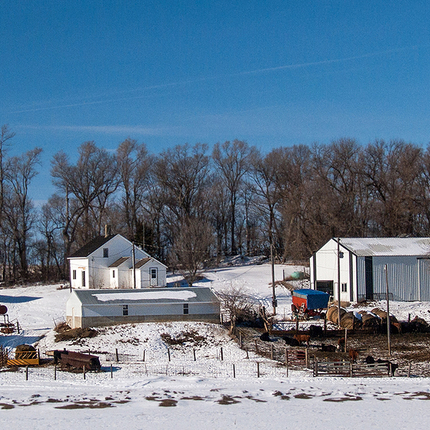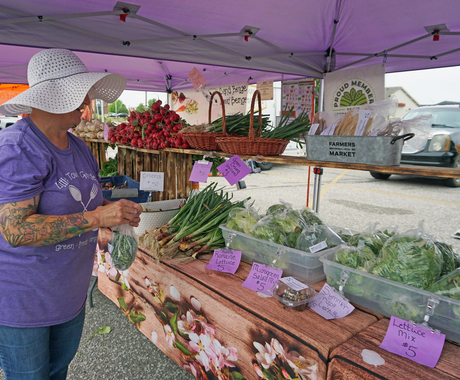By Johnathan Hladik, former policy director
Elected representatives in Nebraska and Iowa will debate a host of contentious issues during the 2017 legislative session. Important items to be debated include budget and tax, health care, energy and environment, and food and agriculture. This article is a preview of select topics that will receive our attention.
Relevant developments concerning priority legislation will be shared via the Center for Rural Affairs Legislative Update.
Budget and Tax
Insufficient progress in 2016 means that property tax will again be a pressing issue in 2017. Concurrently, Gov. Ricketts and others are advocating for an income tax cut. This debate is taking place against the backdrop of sustained revenue declines and an expected $910 million (6.6 percent) budget shortfall. Because of this, we expect development and approval of the biennial budget to be the primary focus of the 2017 legislative session.
We will defend against tax shifts that result in cuts to education and other social services important to low-income individuals. We will support bills that meaningfully address the property tax burden suffered by rural Nebraskans, restore balance to the “three-legged stool” of sales, income and property tax, and make the overall tax system less regressive. We will oppose reform attempts that are contrary to those principles.
Health Care
Election results at the national level have left the Affordable Care Act in peril. Many expect Congress to repeal certain provisions related to Medicaid expansion by March 2017. Nebraska is unlikely to pass an expansion bill under such a scenario. However, our organization and others have developed significant momentum over the past four years.
We will support Medicaid expansion again in 2017. We will also support an interim study to explore health care challenges in Nebraska in the face of a changing federal landscape. We will also consider legislation meant to incorporate critical provisions of the Affordable Care Act into state law. Our primary goal will be to enable more health insurance coverage for low-income Nebraskans, especially those who have fallen into a coverage gap caused by lack of Medicaid expansion in Nebraska.
Energy and Environment
In 2015, we helped pass LB 824, which eliminated a requirement that wind developers acquire special regulatory approval to sell power on the wholesale market or export the energy they generate. This was the result of several years of hard work.
Energy and climate remain a top priority in 2017. After helping to secure passage of LB 824, we turn our attention to defending that progress. We also look for ways to improve on LB 1012, a bill we supported in 2016. That legislation enabled municipalities to create clean energy assessment districts. This opportunity has yet to be utilized.
Food and Agriculture
In 2016, we led an effort to defeat LR 378 CA, a proposed amendment to our state constitution. This amendment would have prevented state and local governments from passing any law or regulation which may “abridge the right of citizens and lawful residents of Nebraska to employ agricultural technology and livestock production and ranching practices without a compelling state interest.”
It is anticipated that proponents may seek to achieve the stated goals of a Right to Farm amendment through statutory means in 2017. If proposed as a bill to amend an existing statute, we will carefully consider the consequences of such legislation and weigh these against the values of our organization. We are committed to working against any legislative effort that will violate our core principles.
Economic Development
2016 saw passage of LB 1083. This bill, among other things, created a Venture Development and Innovation Task Force. Members of the task force spent much of the interim traveling to different parts of the state to learn about opportunities and challenges in economic development. Inadequate access to broadband in rural areas emerged as a top task force priority. We intend to work alongside key partners to address this issue in 2017.
Economic development remains a core element of our work. In addition to securing broad opportunity, it is our responsibility to defend against cuts to effective rural economic development programs. We also have a role in encouraging innovative approaches to rural business development and helping communities modernize in a changing economy.
Iowa Legislative Policy
The 2016 election brought significant changes to the Iowa legislature. As in Nebraska and elsewhere, our primary task is to defend against legislation that will undermine past successes.
We will balance this with a need to proactively move key issues.
Gains made in protecting and encouraging clean energy development in particular must be protected. We oppose legislation that limits the expansion of clean energy transmission. However, we support property rights and effective inclusion of communities and landowners in the siting process.
Iowa continues to struggle with water quality challenges. This puts considerable stress on rural community infrastructure and forces farmers to develop cost-effective ways to reduce pollution. It is anticipated that many will see this session as an opportunity to address this issue. We support smart tax policy to fund Iowa’s Natural Resources and Outdoor Recreation Trust Fund.
Other Issues
Adverse Possession - Nebraska law does not require that an adverse possessor prove payment of property tax in order to satisfy a claim. Nebraska law also does not make payment of property taxes an affirmative defense. We support legislation to a) require that property tax be paid by the adverse possessor over the statutory period in order to satisfy an adverse possession claim and b) require that any adverse possessor compensate the original owner for any property tax paid during the statutory period.
Right to Repair - Many manufacturers withhold diagnostic and repair information, technical updates, and software corrections from the general public. This is especially prevalent in newer farm machinery. As a result, it impossible for individuals and independent repair providers to maintain equipment without the help of the original manufacturer. We support efforts that require the original manufacturer make available for purchase by the owner or an independent repair provider any information or equipment required for repair upon fair and reasonable terms.



